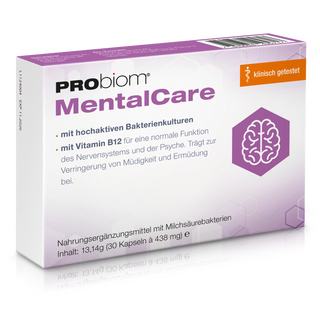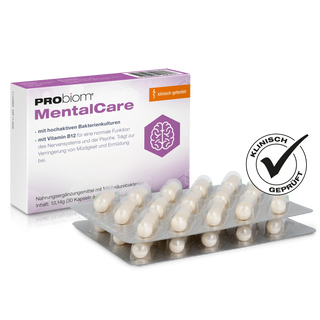The intestinal flora, also known as the microbiome, is a complex ecosystem of trillions of microorganisms that plays a crucial role in our health. It influences not only digestion, but also the immune system, mood, and even the appearance of our skin. However, this delicate balance can be disrupted by stress, poor diet, medications such as antibiotics, or an unbalanced lifestyle. The good news: The intestinal flora can be specifically rebuilt and strengthened.
Why is a healthy intestinal flora so important?
An intact intestinal flora supports nutrient absorption, protects against pathogens, and produces important vitamins such as vitamin K and B vitamins. Furthermore, the intestine is closely connected to the brain—it's not for nothing that we call it the "gut brain." An imbalance in the microbiome can lead to bloating, diarrhea, constipation, skin problems, fatigue, and even depression.
Causes of disturbed intestinal flora
The most common triggers for an imbalance are an unbalanced diet high in sugar and processed foods, excessive use of antibiotics, chronic stress, and lack of sleep. Environmental toxins, lack of exercise, and alcohol consumption can also negatively impact intestinal health.
Building up intestinal flora: How it works
Rebalancing the intestinal flora requires patience and a conscious lifestyle. Rebuilding occurs in several steps:
Adjust your diet
The most important measure is a gut-friendly diet. High-fiber foods such as vegetables, legumes, whole grain products, and flaxseed provide nourishment for the good gut bacteria. Fermented products such as sauerkraut, yogurt, kefir, kombucha, and kimchi also provide valuable lactic acid bacteria that strengthen the microbiome.
However, you should avoid sugar and highly processed foods as much as possible, as they promote the growth of harmful bacteria. You should also reduce your consumption of alcohol and industrial fats.
Use probiotics and prebiotics in a targeted manner
Probiotics are live microorganisms that have a positive effect on the intestinal flora. They are available as dietary supplements but can also be found in fermented foods. Look for supplements containing multiple strains of bacteria, such as Lactobacillus and Bifidobacterium.
Prebiotics, on the other hand, are indigestible plant fibers that serve as "food" for the good bacteria. Chicory, artichokes, Jerusalem artichokes, garlic, onions, and bananas are particularly rich in prebiotics.
Reduce stress and get enough sleep
Chronic stress negatively impacts the microbiome. Methods such as yoga, meditation, breathing exercises, or a walk in the fresh air help lower cortisol levels. Adequate sleep is also essential, as the intestinal flora follows a natural day-night rhythm and regenerates at night.
Use antibiotics only in a targeted manner
Antibiotics not only destroy pathogenic germs, but also beneficial intestinal bacteria. If necessary, their use should be discussed with a doctor and accompanied by probiotic supplements. After treatment, it is especially important to actively rebuild the microbiome.
Integrate exercise into everyday life
Regular exercise not only has a positive effect on digestion, but can also demonstrably increase the diversity of intestinal bacteria. Even 30 minutes of moderate exercise per day, such as walking, cycling, or yoga, can sustainably support intestinal health.
How long does it take to build up the intestinal flora?
This depends on the individual's initial situation. After antibiotic therapy, it can take several weeks to months for the microbiome to return to balance. However, with consistent dietary and lifestyle changes, the first positive effects can often be felt after just a few days.
Conclusion: Strengthen intestinal flora – step by step to greater well-being
Restoring your gut flora isn't a short-term project, but a holistic process. A balanced diet, targeted intake of probiotics and prebiotics, stress reduction, sufficient exercise, and good sleep are the most important factors. Those who regularly take care of their gut will benefit in the long term from improved digestion, more energy, and a strengthened immune system.


















